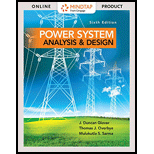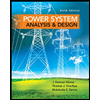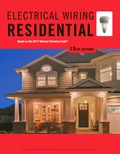
MindTap Engineering, 1 term (6 months) Printed Access Card for Glover/Overbye/Sarma's Power System Analysis and Design, 6th
6th Edition
ISBN: 9781305636323
Author: Glover, J. Duncan, Overbye, Thomas, Sarma, Mulukutla S.
Publisher: Cengage Learning
expand_more
expand_more
format_list_bulleted
Concept explainers
Textbook Question
Chapter 4, Problem 4.1MCQ
ACSR stands for
- Aluminum-clad steel conductor
- Aluminum conductor steel supported
- Aluminum conductor steel reinforced
Expert Solution & Answer
To determine
The full-form of ACSR.
Answer to Problem 4.1MCQ
The correct option is (c), aluminium conductor steel reinforced.
Explanation of Solution
The ACSR stands for aluminium conductor steel-reinforced. It is one of the most common conductor types which consists of aluminium strands layer that surrounds a central core of steel strand. Steel strands used in ACSR conductors gives a high strength-to-weight ratio. The outer aluminium strands have good conductivity, low weight and low cost. ACSR is mainly used in overhead power lines because of its high-capacity and high strength.
So, the correct option is (c).
Want to see more full solutions like this?
Subscribe now to access step-by-step solutions to millions of textbook problems written by subject matter experts!
Students have asked these similar questions
Can you please help me with this problem?
Consider the following transformer circuit assuming an ideal transformer. In this circuit
the signal generator will provide a 10-Volt peak-to-peak sinusoidal signal at a frequency
of 1.0 kHz. Assume that L₁ = 0.65 H, L2 = 0.00492 H (=4.92 mH) and that the coupling
constant = 0.99925.
+
VG1(
R1 1k
N1:N2
11.5:1
12
V1 N1
N2
V2
R2 8.2
1) Find the following using the theory presented in the prelab reading:
a) Start with Equations (2) of the prelab reading and show that the input impedance
to an ideal transformer is given by the equation for Z1 (=V1/11) in Equations (4) of
the prelab reading.
Equations (2) are: V₁ = joLI₁ + jœMI₂ and V₂ = j@MI₁ +j@L₂I₂
The equation for the input impedance is: Z₁ = 1½ = jwL₁ +
(WM)²
jwL₂+ZL
b) Assuming that Z is a real impedance, find the equations for the real and
imaginary parts of Z1.
c) Use your equations from part (b) to calculate the value of the input impedance
(Z) at an operating frequency of 200 Hz. Assume that the load impedance is 8.2
Ohms…
Use: R1 = 1.5K, R2 = 5K, R3 = 1K, R4 = 2K, R5 = 2K, R6 = 1K.
40%: Find the value for Vs (in V) such as IR2 = 1mA.
40%: Find the voltage VD.
20%: simulate the circuit in Falstad (attach the link).
A
1,5k
B
R1
Vs
L
5k
P2
R2
R6
E
C
R3
С
IR2= 1mA
D
H4
R4
2k
2k
R5
Chapter 4 Solutions
MindTap Engineering, 1 term (6 months) Printed Access Card for Glover/Overbye/Sarma's Power System Analysis and Design, 6th
Ch. 4 - ACSR stands for Aluminum-clad steel conductor...Ch. 4 - Overhead transmission-line conductors are bare...Ch. 4 - Alumoweld is an aluminum-clad steel conductor....Ch. 4 - EHV lines often have more than one conductor per...Ch. 4 - Shield wires located above the phase conductors...Ch. 4 - Conductor spacings, types, and sizes do have an...Ch. 4 - A circle with diameter Din.=1000Dmil=dmil has an...Ch. 4 - An ac resistance is higher than a dc resistance....Ch. 4 - Prob. 4.9MCQCh. 4 - Transmission line conductance is usually neglected...
Ch. 4 - Prob. 4.11MCQCh. 4 - Prob. 4.12MCQCh. 4 - For a single-phase, two-wire line consisting of...Ch. 4 - For a three-phase three-wire line consisting of...Ch. 4 - For a balanced three-phase positive-sequence...Ch. 4 - A stranded conductor is an example of a composite...Ch. 4 - lnAk=lnAk True FalseCh. 4 - Prob. 4.18MCQCh. 4 - Expand 6k=13m=12Dkm.Ch. 4 - Prob. 4.20MCQCh. 4 - For a single-phase two-conductor line with...Ch. 4 - In a three-phase line, in order to avoid unequal...Ch. 4 - For a completely transposed three-phase line...Ch. 4 - Prob. 4.24MCQCh. 4 - Does bundling reduce the series reactance of the...Ch. 4 - Does r=e14r=0.788r, which comes in calculation of...Ch. 4 - In terms of line-to-line capacitance, the...Ch. 4 - For either single-phase two-wire line or balanced...Ch. 4 - Prob. 4.29MCQCh. 4 - Prob. 4.30MCQCh. 4 - Prob. 4.31MCQCh. 4 - Prob. 4.32MCQCh. 4 - Prob. 4.33MCQCh. 4 - Prob. 4.34MCQCh. 4 - The affect of the earth plane is to slightly...Ch. 4 - When the electric field strength at a conductor...Ch. 4 - Prob. 4.37MCQCh. 4 - Prob. 4.38MCQCh. 4 - Considering two parallel three-phase circuits that...Ch. 4 - The Aluminum Electrical Conductor Handbook lists a...Ch. 4 - The temperature dependence of resistance is also...Ch. 4 - A transmission-line cable with a length of 2 km...Ch. 4 - One thousand circular mils or 1 kcmil is sometimes...Ch. 4 - A 60-Hz, 765-kV, three-phase overhead transmission...Ch. 4 - A three-phase overhead transmission line is...Ch. 4 - If the per-phase line loss in a 70-km-long...Ch. 4 - A 60-Hz, single-phase two-wire overhead line has...Ch. 4 - Prob. 4.9PCh. 4 - A 60-Hz, three-phase three-wire overhead line has...Ch. 4 - Prob. 4.11PCh. 4 - Find the inductive reactance per mile of a...Ch. 4 - A single-phase overhead transmission line consists...Ch. 4 - Prob. 4.14PCh. 4 - Find the GMR of a stranded conductor consisting of...Ch. 4 - Prob. 4.16PCh. 4 - Determine the GMR of each of the unconventional...Ch. 4 - A 230-kV, 60-Hz, three-phase completely transposed...Ch. 4 - Prob. 4.19PCh. 4 - Calculate the inductive reactance in /km of a...Ch. 4 - Rework Problem 4.20 if the bundled line has (a)...Ch. 4 - Prob. 4.22PCh. 4 - Prob. 4.23PCh. 4 - Prob. 4.24PCh. 4 - For the overhead line of configuration shown in...Ch. 4 - Prob. 4.26PCh. 4 - Figure 4.34 shows double-circuit conductors'...Ch. 4 - For the case of double-circuit, bundle-conductor...Ch. 4 - Prob. 4.29PCh. 4 - Figure 4.37 shows the conductor configuration of a...Ch. 4 - Prob. 4.32PCh. 4 - Prob. 4.33PCh. 4 - Prob. 4.34PCh. 4 - Prob. 4.35PCh. 4 - Prob. 4.36PCh. 4 - Prob. 4.38PCh. 4 - Calculate the capacitance-to-neutral in F/m and...Ch. 4 - Prob. 4.40PCh. 4 - Prob. 4.41PCh. 4 - Prob. 4.42PCh. 4 - Three ACSR Drake conductors are used for a...Ch. 4 - Consider the line of Problem 4.25. Calculate the...Ch. 4 - Prob. 4.45PCh. 4 - Prob. 4.46PCh. 4 - Prob. 4.47PCh. 4 - The capacitance of a single-circuit, three-phase...Ch. 4 - Prob. 4.49PCh. 4 - Prob. 4.50PCh. 4 - Prob. 4.51PCh. 4 - Approximately how many physical transmission...Ch. 4 - Prob. BCSQCh. 4 - Prob. CCSQCh. 4 - Prob. DCSQ
Knowledge Booster
Learn more about
Need a deep-dive on the concept behind this application? Look no further. Learn more about this topic, electrical-engineering and related others by exploring similar questions and additional content below.Similar questions
- The joint pdf of random variables X=1, 2 and Y=1,2,3 is Y P(X,Y)= X [0.105 0.2 0.15] 0.151 0.18arrow_forwardFind the eigenvalues and the corresponding eigen vectors of the following matrix: -5 A = [ 21 -7 4]arrow_forward+ 2) Acircuit is given as shown. (a) Find and label the circuit nodes (6) Determine voltages V₁, V2, V3 and Vy 4V C/E 노동 + 051 V4 + C/E + 3V- + /E5V 1 av + C E uk لا + V3C/E CIE + E6V -arrow_forward
- Consider the following transformer circuit assuming an ideal transformer. In this circuit the signal generator will provide a 10-Volt peak-to-peak sinusoidal signal at a frequency of 1.0 kHz. Assume that L₁ = 0.65 H, L2 = 0.00492 H (=4.92 mH) and that the coupling constant = 0.99925. + VG1( R1 1k N1:N2 11.5:1 12 V1 N1 N2 V2 R2 8.2 1) Find the following using the theory presented in the prelab reading: a) Start with Equations (2) of the prelab reading and show that the input impedance to an ideal transformer is given by the equation for Z1 (=V1/11) in Equations (4) of the prelab reading. Equations (2) are: V₁ = joLI₁ + jœMI₂ and V₂ = j@MI₁ +j@L₂I₂ The equation for the input impedance is: Z₁ = 1½ = jwL₁ + (WM)² jwL₂+ZL b) Assuming that Z is a real impedance, find the equations for the real and imaginary parts of Z1. c) Use your equations from part (b) to calculate the value of the input impedance (Z) at an operating frequency of 200 Hz. Assume that the load impedance is 8.2 Ohms…arrow_forwardHANDWRITTEN SOLUTION PLEASE NOT USING AIarrow_forwardFor the network of Fig. 7.93, determine: a. ID, and VGS₂- 18 V b. Vps and Vs. Shockley's equation, VGS ID= Vp) ID Vos V 1- VIDSS VGSQ VG = R₂VDD R₁ + R2 VGS VG-IDRS VDS VDD-ID(RD + Rs) (a) ID = 9 mA, VGS₁ = 0.5 V (b) VDs = 7.69 V, Vs = -0.5 V • 2.2 ΚΩ Dss = 8 mA Vp=-8V • 0.39 ΚΩ 8-4 V FIG. 7.93arrow_forward
- 4-9 A separate excited dc generator turning at 1400 r/min produces an induced voltage of 127 V. The armature resistance is 2 and the machine delivers a current of 12 A. Calculate a. the terminal voltage [V] b. the heat dissipated in the armature [W] c. the braking torque exerted by the armature [N-m]arrow_forward1. Label the x, y, z coordinates for each frame. 2. Compute the homogeneous transformation matrices H between frames 0, 1, 2, and end- effector. 3. Use your MATLAB function to compute H°3. 01 d₁ d 02 d3arrow_forward4-8 Explain the difference between shunt, com- pound, and differential compound generators a. as to construction b. as to electrical propertiesarrow_forward
arrow_back_ios
SEE MORE QUESTIONS
arrow_forward_ios
Recommended textbooks for you
 Power System Analysis and Design (MindTap Course ...Electrical EngineeringISBN:9781305632134Author:J. Duncan Glover, Thomas Overbye, Mulukutla S. SarmaPublisher:Cengage Learning
Power System Analysis and Design (MindTap Course ...Electrical EngineeringISBN:9781305632134Author:J. Duncan Glover, Thomas Overbye, Mulukutla S. SarmaPublisher:Cengage Learning EBK ELECTRICAL WIRING RESIDENTIALElectrical EngineeringISBN:9781337516549Author:SimmonsPublisher:CENGAGE LEARNING - CONSIGNMENT
EBK ELECTRICAL WIRING RESIDENTIALElectrical EngineeringISBN:9781337516549Author:SimmonsPublisher:CENGAGE LEARNING - CONSIGNMENT

Power System Analysis and Design (MindTap Course ...
Electrical Engineering
ISBN:9781305632134
Author:J. Duncan Glover, Thomas Overbye, Mulukutla S. Sarma
Publisher:Cengage Learning

EBK ELECTRICAL WIRING RESIDENTIAL
Electrical Engineering
ISBN:9781337516549
Author:Simmons
Publisher:CENGAGE LEARNING - CONSIGNMENT
Types of House Wiring - Types of Electrical Wiring - Electrical Wiring; Author: Learning Engineering;https://www.youtube.com/watch?v=A5P-buWX-dA;License: Standard Youtube License